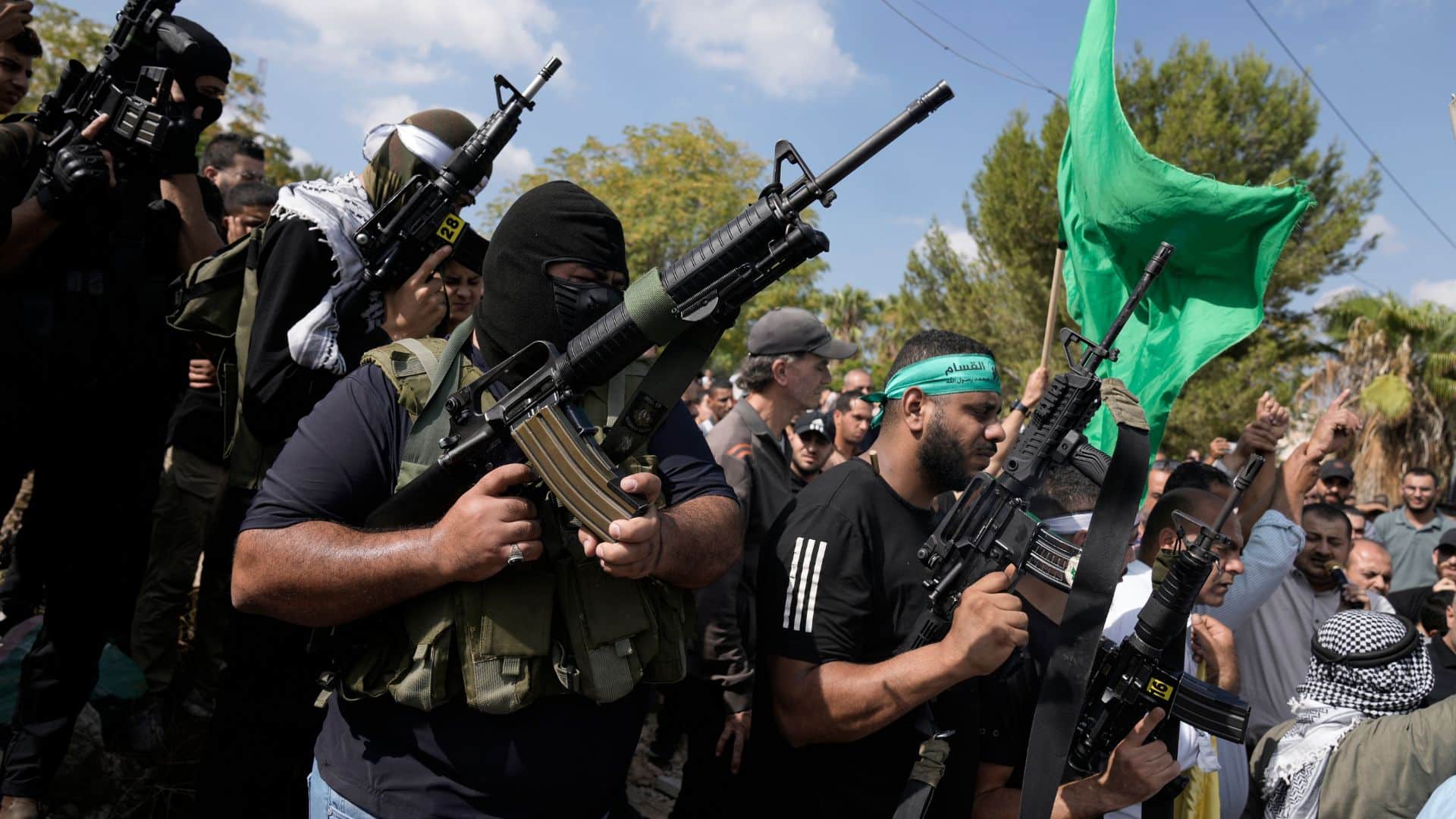Hamas shatters the illusion of Israeli control.

Palestinian militants attend a funeral of people killed during an Israeli military raid on a Palestinian refugee camp, Nur Shams, in the West Bank 20 October, 2023. (AP Photo/Majdi Mohammed)
This article was produced exclusively for News Decoder’s global news service. It is through articles like this that News Decoder strives to provide context to complex global events and issues and teach global awareness through the lens of journalism. Learn how you can incorporate our resources and services into your classroom or educational program.
Atrocious images of the attack on Israel by Hamas or of pitiless Israeli reprisals against the Gaza Strip may prompt us to cast one side or the other as irredeemably evil, beyond the pale of humanity.
Shocking as the latest eruption of Middle East violence may be, perhaps we should remind ourselves that all those involved, victims or perpetrators (they may be both) are indeed human beings like us. And as such, capable of the worst and the best.
I share the revulsion at the slaughter of Israeli civilians, by far the bloodiest inflicted by Palestinians on Israelis. My stomach also turns at the indiscriminate killing of civilians in Gaza.
Israel says 1,400 of its citizens, mostly civilians, were killed and more than 200 taken to Gaza as hostages in the Hamas assault on 7 October, in which 1,500 attackers were killed after they had burst through Israeli defences to wreak carnage in border towns and military posts.
So far, Israeli strikes on Gaza have killed more than 3,700 people, according to the Hamas-run health ministry. Israel has sealed off the densely populated and impoverished enclave, cutting off fuel, electricity and most water supplies. It has told half of Gaza’s 2.2 million residents to flee southwards before a threatened ground offensive, exacerbating a humanitarian crisis.
Context matters.
Many Western leaders have echoed Israeli voices demanding unequivocal condemnation of Hamas, the Islamist political and military organisation ruling Gaza since 2007 when it evicted Fatah, its secular Palestinian rival which still holds sway in the occupied West Bank.
“Nothing can justify terrorism, there can never be a ‘yes, but’,” declared French President Emmanuel Macron.
Were Hamas militants not barbaric terrorists, or “human animals” as Israel’s defence minister called them, driven by anti-semitic hatred and religious fanaticism?
Wherever your sympathies lie in the Israeli-Palestinian conflict, context matters. Dehumanising adversaries does not help us understand events rooted in a struggle that has raged for more than a century — and which once again threatens to ignite a regional conflagration.
Many Arabs, even those appalled by Hamas excesses, deplore what they see as Western double standards, with Israel seeming to get a free pass for its occupation of Palestinian land and what Israeli and other human rights groups and United Nations investigators describe as an apartheid system.
A conflict with deep roots
Outrage in the Arab street over the fate of Gaza has set back, if not sunk, U.S.-backed moves to promote ties between Israel and Saudi Arabia and other Arab states so far wary of openly abandoning the Palestinian cause. Iran, a Hamas ally, has cause to rejoice at this outcome.
The passions aroused by the Israeli-Palestinian conflict go back a long way — one of the few statements that colliding historical narratives might both accept.
The Zionist dream of a national home in Palestine took political shape in the late 19th century. In 1917 Britain endorsed the demand in what became known as the Balfour Declaration — to the alarm of many in the majority Arab population, formerly under the Ottoman Empire, which collapsed in World War One.
Britain won a mandate to rule Palestine in a post-war carve-up of the Middle East, but withdrew in 1948, unable to resolve the Arab-Jewish conflict it had helped create.
The modern state of Israel was immediately declared, promising a safe haven for Jews fleeing persecution after the horrors of the Holocaust during World War Two.
The forces of the new state fought off Arab armies and brought about the expulsion or flight to neighbouring countries of around 700,000 Palestinians, about half the Arab population at the time.
Palestinians ended up without a state. About 70% of Gaza’s population today are refugees or their descendants who once had their homes in what is now Israel.
Deep scars on both sides
If the Holocaust constitutes Israel’s most profound trauma, for Palestinians it is the “Nakba”, or catastrophe, of their dispossession in the 1948 war.
The years since — and countless attempts at peacemaking — have not resolved the fundamental political dispute between two peoples claiming the same land as their birthright.
Israeli Prime Minister Benjamin Netanyahu’s far-right government has called for annexation of the occupied West Bank in its policy statement. Israel has already annexed other territories it seized in the 1967 war such as east Jerusalem and Syria’s Golan Heights in defiance of international law.
Decades of diplomacy aimed at a “two-state solution” lies in tatters.
In 1988, Yasser Arafat’s Palestine Liberation Organisation (PLO) declared it would accept statehood within the already truncated pre-1967 borders, in other words the West Bank, including east Jerusalem, and the Gaza Strip — or just 22% of Britain’s Palestine mandate.
For Palestinians, this was a huge concession.
Glossary of terms
Balfour Declaration: A statement written by former British Prime Minister Arthur Balfour and issued by the British government during World War One in support of establishment of home for the Jewish people in Palestine.
Oslo Accords: A set of agreements between Israel and the Palestine Liberation Organisation (PLO) in 1993 in Oslo that laid out the framework for a two-state solution. It gave limited self-governance for Palestinians in the West Bank and the Gaza Strip.
Intifada: An uprising of Palestinian Arabs in the West Bank and Gaza against Israel.
The rise of Hamas and the Israeli ultra-right
Hamas, founded in 1987, denounced it as a betrayal, although in a 2017 revision of its charter it acknowledged that statehood on these lines, along with the return of refugees, was “a formula of national consensus”. Nevertheless, it kept its ultimate goal as “the full and complete liberation of Palestine”. No room for Israel there.
Peace hopes flickered into life with the 1993 Oslo Accords. Israel and the PLO agreed on limited Palestinian autonomy in the West Bank and Gaza.
This was anathema to Israel’s right-wing nationalist and religious settler movements which sought Israeli sovereignty over all of the West Bank and east Jerusalem.
Israeli settlements in the occupied West Bank and Golan Heights have multiplied and expanded under successive governments since 1967. An Israeli ultranationalist opposed to the Oslo Accords assassinated Prime Minister Itzhak Rabin in 1995.
The two-state solution suffered another lethal blow during the second Palestinian intifada which erupted in 2000 after U.S. diplomacy failed to clinch a final peace deal. Over the next five years, Palestinian suicide bombings were countered with Israeli air strikes, demolitions, no-go zones, curfews and construction of a formidable security barrier that runs mostly within the West Bank.
Palestinian Authority marginalised
Israel unilaterally withdrew from Gaza and dismantled settlements there in 2005, but kept tight control of its borders, waters and airspace, effectively confining its inhabitants.
Hamas won a parliamentary election in 2006 and seized control of Gaza, then under the Palestinian Authority set up by the Oslo Accords, the following year.
Netanyahu has made no secret of his belief that the continuing split between Gaza and the West Bank helps protect Israel from having to engage the Palestinians in further peace talks.
The world has increasingly looked away, in effect giving Israel a free hand.
Western and Arab leaders alike paid scant attention to the Palestinians, apart from giving aid to prop up the feeble and corrupt Palestinian Authority, or to provide a minimum lifeline to Gaza, blockaded by Israel and, since 2014, Egypt.
Hamas and Israel have fought a series of unequal wars in recent years, described by the Israeli military as periodically “mowing the grass” to weaken the Islamist militia.
Western leaders have clung to the mantra of a two-state solution even as Israel has intensified its colonisation of the West Bank and east Jerusalem in a way calculated to render such a solution impossible.
Hamas undoubtedly chose repugnant methods, but its 7 October eruption from Gaza has punctured the world’s amnesia, as well as Israel’s sense of inviolability, and thrust the future of the Palestinians and the wider region to the centre of international attention. At least for now.
questions to consider:
- Why does context matter?
- Is religion or politics the main driver for the Israeli-Palestinian conflict?
- How safe is it to ignore this apparently intractable dispute?

Alistair Lyon is former Middle East diplomatic correspondent for Reuters. During three decades at the news agency, he covered conflicts as well as political and economic news in the Middle East and beyond. He began in Lebanon and headed bureaus in Jordan, Turkey, Pakistan/Afghanistan and Egypt/Sudan. He spent five years in London as Middle East diplomatic correspondent and five in Beirut as special correspondent, Middle East.
Read more News Decoder stories about the Israeli-Palestinian conflict here:
